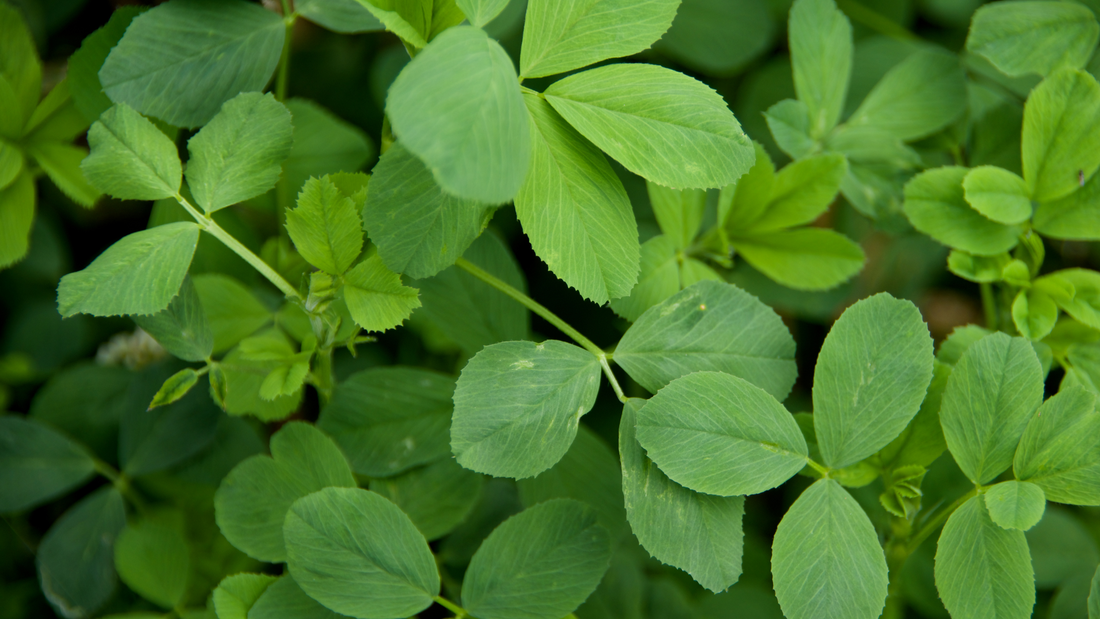The Power of Alfalfa: Nutritional Benefits and Uses Explored

Share
What Is Alfalfa?
Alfalfa is a legume native to temperate climates, often grown as a forage crop for livestock. Its deep roots—reaching up to 15 meters—allow it to absorb a wealth of nutrients from the soil, making it a nutritional powerhouse. With small purple flowers and tender sprouts, alfalfa is as versatile as it is nutritious.
Nutritional Profile of Alfalfa
Alfalfa is rich in vitamins A, C, E, and K, as well as minerals like calcium, potassium, iron, and zinc. Its leaves and sprouts contain protein and essential amino acids, making it a valuable addition to plant-based diets. According to research, alfalfa’s nutrient density stems from its ability to draw minerals from deep soil layers (Britannica, 2025).
Potential Health Benefits of Alfalfa Leaf
Alfalfa leaf has been studied for its potential to support various aspects of health. Below are some benefits backed by research, though effects may vary by individual.
1. Supports Digestive Health
Alfalfa’s high fiber content may promote regular bowel movements and support a healthy gut microbiome by acting as a prebiotic (NCBI, 2022). It also contains enzymes like amylase and lipase, which may aid in digesting carbohydrates and fats, potentially reducing bloating or indigestion.
2. May Support Kidney Function
Some studies suggest alfalfa’s diuretic properties could help increase urine flow, assisting the kidneys in flushing out toxins and reducing fluid retention (NCBI, 2022). This may benefit those with mild fluid buildup, but more research is needed to confirm effects on kidney stone prevention or urinary health.
3. Promotes Cardiovascular Health
Alfalfa contains saponins, compounds that may bind to cholesterol in the gut, potentially lowering LDL (“bad”) cholesterol levels without affecting HDL (“good”) cholesterol (NCBI, 2018). Its antioxidants may also reduce inflammation, supporting heart health, though long-term benefits require further study.
4. Boosts Immune Function
With vitamin C, zinc, and iron, alfalfa may support immune health. Vitamin C acts as an antioxidant, protecting cells, while zinc aids in immune cell production (NCBI, 2013). These nutrients could help maintain a robust immune response, especially when paired with a balanced diet.
5. Aids Muscle Recovery
For fitness enthusiasts, alfalfa’s protein and amino acids may support muscle repair, while potassium and calcium promote proper muscle function. While not a primary protein source, alfalfa can complement a diet aimed at recovery and performance.
Alfalfa’s Broader Health Benefits
Beyond the benefits above, alfalfa’s mild diuretic effect may help manage fluid retention, and its nutrient density supports overall wellness. We include alfalfa extract in our Endocrine Cleanse and Support Tonic for its antioxidant properties, which may contribute to general health when used as part of a balanced lifestyle.
Alfalfa Leaf Tea: A Soothing Option
Alfalfa leaf tea is an easy way to enjoy its potential benefits. It may aid digestion, reduce inflammation, and offer a gentle detox effect. Steep dried alfalfa leaves for 5–10 minutes for a nutrient-packed beverage. Always source high-quality, organic alfalfa to avoid contaminants.
Alfalfa Sprouts: A Nutrient-Dense Superfood
Alfalfa sprouts are low-calorie, high-nutrient seedlings perfect for salads, sandwiches, or smoothies. They’re rich in antioxidants and enzymes that may support digestion and metabolic health. Their mild flavor and crunch make them a versatile addition to any meal.
How to Incorporate Alfalfa Into Your Diet
-
Sprouts: Add fresh alfalfa sprouts to salads or wraps for a nutrient boost.
-
Tea: Brew dried alfalfa leaves for a soothing, health-supportive drink.
-
Supplements: Capsules or tonics, like our Endocrine Cleanse and Support Tonic, offer concentrated doses. Follow dosage guidelines to avoid overconsumption.
-
Cooking: Use alfalfa leaves sparingly in soups or stir-fries, ensuring they’re from a trusted source.
Safety Precautions and Considerations
While alfalfa is generally safe as a food, precautions are needed:
-
Vitamin K: High levels may interact with blood thinners like warfarin. Consult your doctor if you’re on such medications.
-
Autoimmune Conditions: Alfalfa’s immune-stimulating effects, especially in supplements, may not be suitable for those with autoimmune diseases.
-
Pregnancy/Breastfeeding: Limited data exists; speak with a healthcare provider.
-
Contamination Risk: Ensure sprouts are fresh and properly handled to avoid bacterial contamination.
Always consult a healthcare professional before adding alfalfa supplements to your routine, especially if you have pre-existing conditions or take medications.